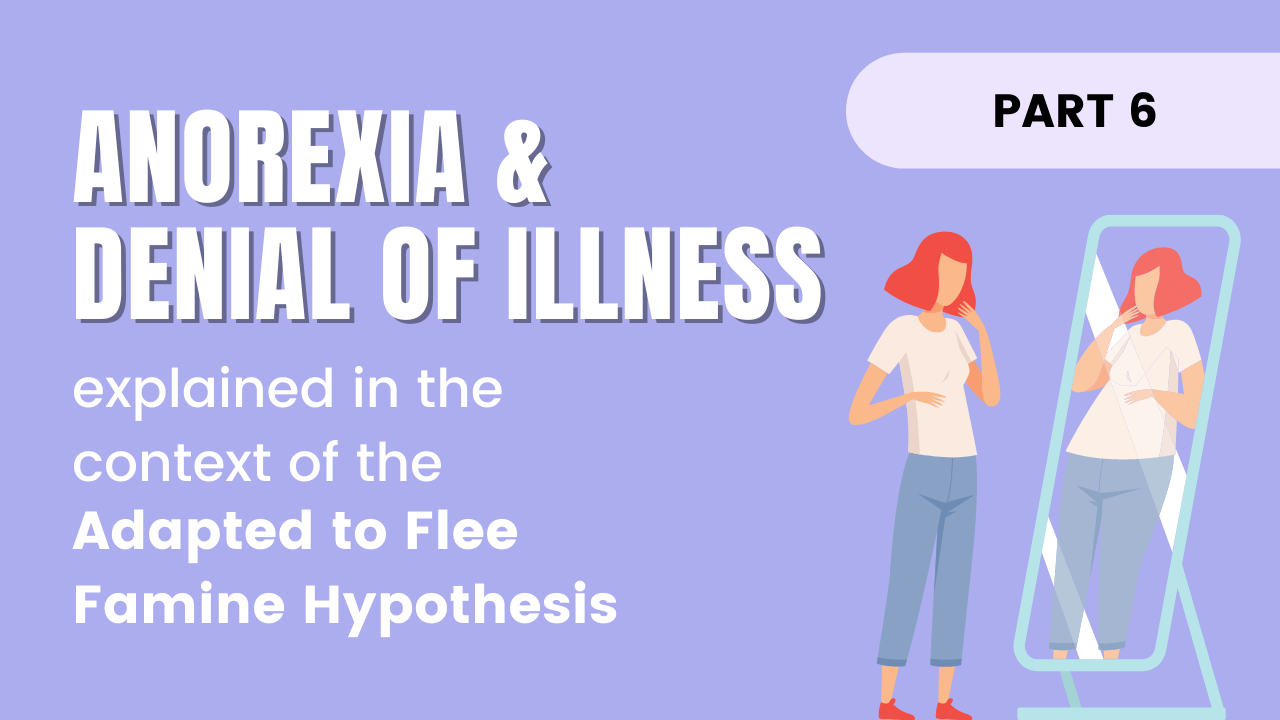Anorexia & Denial of Illness EXPLAINED (Adapted to Flee Famine Hypothesis PART 6)
Apr 11, 2022
Welcome to part 6 of my series explaining the evolutionary biology of Anorexia using the Adapted to Flee Famine Hypothesis! In the last 2 posts, we discussed the symptoms restriction and hyperactivity. In this post, you’ll be learning about the third core symptom, which is denial of illness and delusional body image.
Although not everyone with an eating disorder struggles with body dysmorphia to the extent of considering oneself to be fat, obliviousness to one’s true state of health – or should I say lack of health – is a characteristic that is ubiquitous across all anorexia patients.
As I mentioned all the way back in part 1 of this series, I never saw myself as fat…but because Anorexia is often portrayed as the stereotypical graphic of an emaciated woman looking in the mirror only to be staring back at an overweight version, I thought I didn’t “qualify” as a true anorexic, and denied having anorexia for many years.

I knew I was thin, but I never realized my level of thinness was “thin enough” to be dangerous enough to kill me. It’s this very distorted version of reality however, that can be seen as an adapted survival mechanism in times of scarcity. Keep on reading to learn why!
Benefits of Delusional Body Image
As I described in previous posts of this series, our ancestors were mostly hunter-gatherers that relied on resources in their direct environment. If resources were to become scarce, starving foragers would need to migrate to a place in which food was abundant. The inability to perceive their levels of emaciation would have been highly beneficial in such a time. Why? If they believed they were healthy, they would be more likely to confidently move on and continue migrating rather than being distracted by the worry of their fragile state.
Interoception & Anorexia
Furthermore, people with Anorexia often struggle with interoception, the sense through which we monitor the inner state of our bodies and understand whether we’re hungry, thirsty, too hot, or too cold. This lack of interoceptive awareness helps explain why Anorexic individuals often experience anosognosia, the scientific term for believing you’re not “sick enough”.
Interoception & Autism
Difficulty with interoception is also a very common autistic trait, which provides scientific evidence for why so many Autistic people develop Anorexia. If you’re interested in learning more about the scientific link between Autism and Anorexia, I highly recommend you read my post Interoception in Autism and Anorexia as well as my post Alexithymia: a scientific link between Autism, Anorexia, and Anxiety.
Opioid Levels
Lastly, opioid levels may also be partly responsible for an Anorexic’s denial of starvation. Opioids and most recreational drugs heighten one’s sense of self-deception, and most fascinating is that higher serum levels of endogenous opioids have been found in Anorexia patients. These elevations of neuroendocrine hormones can contribute to feelings of euphoria and unconcern, even while being in a near-death state of health.
Anorexia in the Middle Ages
Aside from what we just learned about our ancestors and interoception, it’s very important to note that body image distortion and denial of illness were also characteristic of the anorexic saints and other anorexic accounts throughout history, as I elaborated on in part 4 of this series.
During the Middle Ages, the ideal female body was a curvaceous one. Not to mention, there was no social media that could be promoting an unrealistic thin ideal, let alone, what I eat in a day videos! This further implies that the denial of starvation, along with restriction and hyperactivity, would have served a very important biological function in times of famine.
Send me a DM on Instagram to let me know what your experience is with body dysmorphia, and if this series has helped you understand Anorexia better so far! If it has, be sure to subscribe to my newsletter to get more free value delivered straight to your inbox. In part 7 of this AFFH series, you'll learn how all of this knowledge can be applied to treatment of Anorexia. Chat soon!
FULL TEXT: Adapted to Flee Famine Hypothesis




